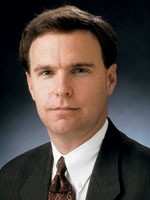Says Proposal Harmful to Small Businesses, Rural
Communities
The user fee plan advocated by the major airlines and the
Federal Aviation Administration (FAA) would be disastrous for the
national aviation system, and for small and mid-size businesses in
rural areas across the country. That's what Ed Bolen, president and
CEO of the National Business Aviation Association (NBAA), told a
congressional subcommittee Thursday.

In testimony before the Senate Aviation Subcommittee of the
Committee on Commerce, Science and Transportation, Bolen argued
that although the FAA -- and its airline backers -- are
calling the reauthorization bill a modernization plan, "the facts,
and history, tell a different story. This is not a modernization
bill."
He said the FAA bill is at odds with the thought behind
"modernization" -- i.e., making something better --
because it contains provisions that would overthrow a funding
structure that has proven to be stable, reliable and growing for
more than 25 years, in exchange for a radical user fee regime that
would jeopardize the largest, safest and most efficient air
transportation system in the world.
 Bolen (right) pointed out the
bill includes:
Bolen (right) pointed out the
bill includes:
- A $600 million cut in FAA funding;
- Authorization to permit the FAA to go into debt up to $5
billion starting in 2013;
- Diversion of funds for air traffic control transformation to
create a bureaucracy to assess and collect user fees. Whether the
bureaucracy is built inside the government, or outside through
contractors, money must be used to create and maintain the
bureaucracy, which Bolen called "a virtual IRS Branch for the
FAA."
"Revenues going into the Airport and Airways Trust Fund are at
record levels, and no less an authority than the Congressional
Budget Office has said that the FAA will continue to have
sufficient funds to fully support the transition to the Next
Generation Air Traffic System," he said.
Bolen reminded the subcommittee that, in 1997, the airlines
advocated user fees were needed to overhaul aviation system
funding. A decade ago, airlines also wanted to shift some $600
million in costs, and reduce the role of Congress in aviation
system oversight.
"To everyone who was around the last time the nation's big
airlines pushed that scheme, there is a strong sense of
déjà vu," Bolen said. "This time around, the airlines
have picked a new target for their tax shift -- general aviation --
and they have increased the amount to $2 billion.
Bolen maintained the battle over aviation user fees is a battle
over whether Congress will retain control of the air traffic system
or whether that control will shift to unelected bureaucrats or even
industry.
 Additionally, allowing
the airlines' plan to prevail would impose devastating costs on the
small and mid-size businesses that rely upon "general aviation" in
small and rural towns nationwide.
Additionally, allowing
the airlines' plan to prevail would impose devastating costs on the
small and mid-size businesses that rely upon "general aviation" in
small and rural towns nationwide.
"Expanding the capacity of our nation's air transportation
system to accommodate demand can and must be a national priority,
designed to serve all system users," Bolen testified. "No one
should mistake aviation user fees with a modernization plan."
Bolen urged the subcommittee to immediately reject aviation user
fees in any form and work within the established congressional
process to expand system capacity to enhance mobility for all
Americans.
 ANN's Daily Aero-Linx (05.06.25)
ANN's Daily Aero-Linx (05.06.25) ANN's Daily Aero-Term (05.06.25): Ultrahigh Frequency (UHF)
ANN's Daily Aero-Term (05.06.25): Ultrahigh Frequency (UHF) ANN FAQ: Q&A 101
ANN FAQ: Q&A 101 Classic Aero-TV: Virtual Reality Painting--PPG Leverages Technology for Training
Classic Aero-TV: Virtual Reality Painting--PPG Leverages Technology for Training Airborne 05.02.25: Joby Crewed Milestone, Diamond Club, Canadian Pilot Insurance
Airborne 05.02.25: Joby Crewed Milestone, Diamond Club, Canadian Pilot Insurance





